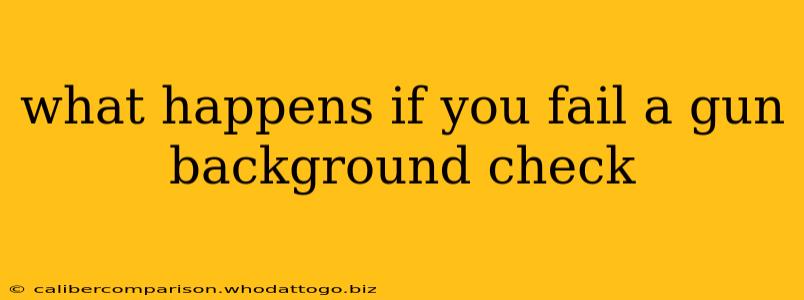Failing a gun background check can have significant consequences, impacting your ability to legally purchase firearms and potentially leading to legal repercussions. Understanding the process and potential outcomes is crucial for anyone considering firearm ownership. This guide will break down what happens if your background check is denied, the reasons behind denials, and your options moving forward.
The Gun Background Check Process: A Brief Overview
Before delving into the consequences of failure, let's briefly review the process itself. When you attempt to purchase a firearm from a licensed dealer (FFL), the dealer initiates a background check through the National Instant Criminal Background Check System (NICS). This system checks your information against various federal and state databases to determine if you're legally eligible to own a firearm.
Reasons for a Failed Gun Background Check
Several factors can lead to a denied application. These include, but aren't limited to:
-
Felony Conviction: A conviction for a felony crime is a common reason for disqualification. The specifics can vary by state, but generally, a felony conviction prohibits firearm ownership.
-
Domestic Violence Misdemeanor Conviction: Conviction for a misdemeanor domestic violence offense often results in a denial. This is a significant restriction designed to protect potential victims.
-
Prior Restraining Order: A restraining order, particularly one involving domestic violence, can prevent you from purchasing a firearm.
-
Drug Use or Addiction: Depending on the specifics and state laws, a history of illegal drug use or addiction may disqualify you.
-
Mental Health Status: Individuals adjudicated as mentally defective or committed to a mental institution may be prohibited from owning firearms. State laws vary regarding the specifics of this criterion.
-
Dishonorable Discharge from the Military: A dishonorable discharge from the armed forces can result in a denial.
-
Renunciation of Citizenship: Renouncing your U.S. citizenship can affect your eligibility.
-
Illegal Alien Status: Being an illegal alien in the United States typically prevents firearm ownership.
What Happens After a Denied Application?
If your background check is denied, you'll receive notification from the dealer. This notification won't usually detail the specific reason for the denial; it simply states that the transfer is prohibited. You have the right to appeal the denial, although the process and likelihood of success can vary depending on the reason for denial and your state's laws.
Appealing a Denied Application
Appealing a NICS denial can be a complex legal process. It often requires contacting the ATF (Bureau of Alcohol, Tobacco, Firearms and Explosives) and potentially seeking legal counsel. You’ll need to gather evidence to challenge the reason for the denial, which can be time-consuming and challenging.
Preventing a Failed Background Check
The best approach is preventative. Before attempting to purchase a firearm, thoroughly review your record to ensure you meet all legal requirements. If you have any concerns about your eligibility, consult with a legal professional specializing in firearms law before initiating the purchase process.
Conclusion
Failing a gun background check carries significant implications, limiting your ability to own firearms and potentially leading to legal challenges. Understanding the reasons for denial and the process for appealing a decision is crucial for anyone considering firearm ownership. Always prioritize adherence to federal and state laws and seek legal counsel when necessary. Remember, this information is for educational purposes and should not be considered legal advice. Always consult with a legal professional for guidance specific to your situation.

